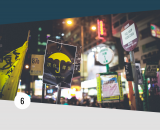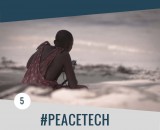Women, War, and Peace: An Interview with Abigail Disney

In October 2013, Alliance for Peacebuilding president Melanie Greenberg and Building Peace editor- in-chief Jessica Berns spoke with Abigail Disney, philanthropist and filmmaker, about the role women play in contributing to social change and building and sustaining peace in their communities and nations. The interview reveals the genesis of the award- winning documentary, Pray the Devil Back to Hell, which Disney produced in 2008, as well as her most recent initiatives for change.
Disney cofounded the Daphne Foundation, which works with low-income communities in the five boroughs of New York City. She also founded Peace is Loud, which amplifies women’s voices for peacebuilding using the power of media. She was an executive producer of the 2011 PBS series Women, War & Peace. Disney serves as a board member for a number of organizations, including the Global Fund for Women and the Peace Research Endowment.
BP: What initially sparked your interest in documentary films focusing on women, war, and peace?
Disney: I went to Liberia in 2006, just a few months after President Sirleaf was inaugurated. While there, I heard the story that Pray the Devil Back to Hell is based on: that women across different religious, ethnic, and educational lines effectively came together to push for an end to the long-standing civil war. I came back home obsessed with that story, saying to people that someone should make a documentary on this. Eventually my brother, who is a filmmaker, said I should make the documentary. I come from a filmmaking family, so I decided to go for it and tell the story myself.
BP: What do you understand to be universal about the experience of women and war?
Disney: When we were making Women, War & Peace, we had four edit rooms open simultaneously. We were working on documentaries about women and war in four very different places, but the resonances coming across the monitors were quite powerful. You’d be in the Afghanistan edit room and you’d hear a woman describe the life of a refugee and then you’d go into the Colombia room and you’d hear almost the same thing word for word.
When you talk to combatants about war, they tend to describe the specifics of their war and their context, but women civilians all describe one thing: fire and metal, running and starvation, and fear. For civilians, war is reduced to a handful of very common experiences.
BP: Where there stories that Women, War, & Peace didn’t capture that you wished it had?
Disney: Yes! Every country has a story that is worth telling. I wish we could have shared the story of the women on different sides of the Sri Lankan conflict who had lost children who came together to reconcile. Or all the women in Northern Ireland who pushed that peace process forward yet are rarely recognized for their role. Or the mothers in Moscow who spoke up to protest their sons going to fight in Chechnya. There are so many important stories still to tell about the creative and important ways women stand up to war.
BP: How do audiences in the United States react to your films?
Disney: Audiences in the United States don’t think of themselves as part of the country that’s fighting in a war. This is a terrible tragedy for us as a country, and it’s a crime against the people who are out there risking their lives and fighting all the time. We cannot forget the wars we are fighting. That’s why there should be a draft and a war tax, so that the people who are paying the highest price for the war, their lives that is, will not all come from a separate, easily forgotten class. It will be the responsibility of all of us.
BP: How do men react to your films?
Disney: We’ve actually shown the film to three or four different all-male schools, and it’s been a very interesting experience. One question invariably comes up, “Why are there no good men in your film?”
I always say there are lots of good men in the film if you really watch. Men are carrying grandmothers on their backs, helping refugees, and finding water. Men are all over the place doing good things. I then turn the question back to the male audience and ask why they didn’t notice them. Why does a small, good deed by a man go unnoticed? Must men be showcased doing the big, important, highly visible deed?
This connects to peacebuilding. In making peace, there is no room for the hero narrative and we all need to understand and accept this. Peace comes because people make a decision to stop fighting. We need to begin understanding leadership not as big, heroic moments but as the ability to move people in the right direction.
BP: This relates to UN Security Resolution 1325 and the formal role of women as peacemakers, builders, and leaders. Despite the passage of 1325, why aren’t we seeing women’s roles expanding?
Disney: 1325 is important but I think it can seem lofty and lack concreteness. The value of documentary films is that they offer a concrete picture of what 1325 is meant to embrace and encourage. We have heard from peacebuilders that the films provide tangible evidence of what is possible and the impact women can have.
BP: How can documentary films contribute to social change? You just mentioned one, which is making abstract ideas more concrete.
Disney: Starting out, the goal was to use documentary film to make women visible. They’re never going to matter in the future if we can’t show the way they mattered in the past both to themselves and to others.
However, once the film was made and we starting showing it worldwide, I realized it was serving a different, unintended purpose: to motivate women to act in their own contexts. Even if women haven’t been through conflict themselves, they have the same experience of being blocked from processes. They know what it is to yell and yell and never be heard, and they are motivated by the planfulness of the Liberian women in Pray the Devil and they want to talk strategically about creating change in their own environments. I did not expect that our films would unlock so many other movements.
BP: What do you think about the line of argument that women are natural peacebuilders?
Disney: I’m not comfortable with that logic. I don’t want to make any kind of claims for women as natural peacebuilders or as being automatically peaceful. Women are as capable of leading us into war as men. However, as a matter of general behavior, women tend to live at the heart of what we associate with peacefulness: raising families and assuming responsibility for the basic well-being of their families. Many of us associate peacefulness with gathering around the table with family, and that’s what women are in charge of. So they have an affinity for peace that can’t be denied.
BP: Do you see a difference between how women of different generations understand peace and their role in creating change?
Disney: I see huge generational differences among women in the developed world specifically. Often, women in their twenties have the impression that everything is equal and fair and good between men and women. And then they get to a certain point in their lives— marriage, babies, career, for instance—and they realize that women still have to fight. Nobody wants to be a feminist at 20! I think most women get there because something happened to them.
In the developing world, the young women are ready to get out there and fight for change, and frankly, I think they want the older women to make way for them to come up. Right now, I don’t see a lot of room for the younger generation to rise, and I think that’s a bit of an issue across Africa.
BP: As a philanthropist how are you supporting exchange of stories and strategies among women?
Disney: My foundation recently launched an organization called Peace is Loud, the purpose of which is to create that environment where peacebuilders, men and women, can share their stories. We need to be heard, to commit, and to work for peace. Peace is Loud comes from something that Sugars, an elder woman featured in Pray the Devil said, “Peace is not an event. Peace is a process.” And that process is loud and messy. We are trying to promote an understanding that peace may be an agreement to disagree amicably. Peace is dynamic and ever changing.
BP: Is there a bright spot for you in terms of a community of women or a community of men and women in the world where you just see incredible change and activity happening?
Disney: The bright spot is that women are connecting around the world in ways they never had an opportunity to before, talking to each other, learning from each other, and getting strength from each other.

